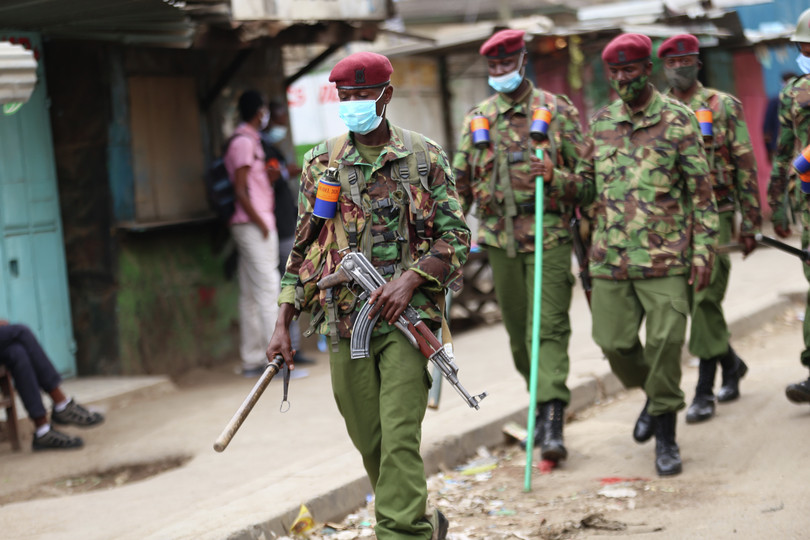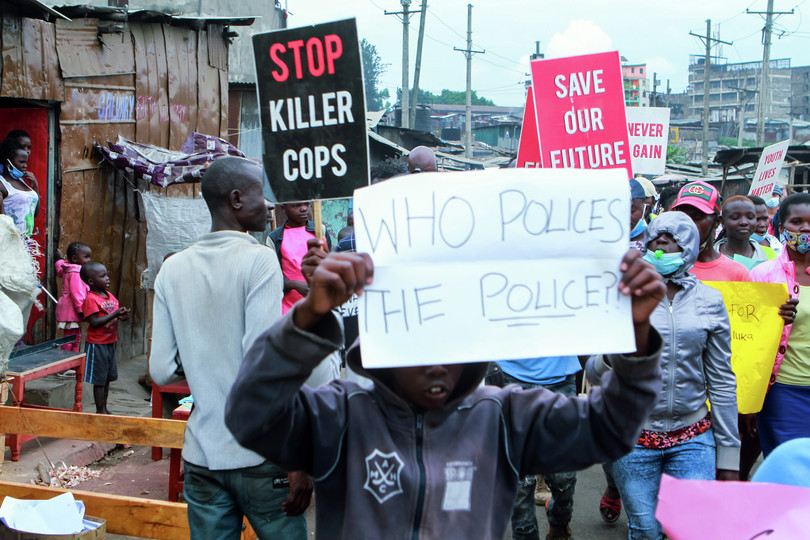Kenyan gang members are facing increased police extortion.
On 14 June 2020, residents of Nakuru, Kenya, woke up to the shocking news that a local gang leader, popularly known as ‘Kidum’, had hanged himself with a belt at Railways police station. Kidum was a key suspect in a spate of robberies sweeping the city, but according to residents, he was also a middleman for plainclothes police officers involved in a motorcycle-theft syndicate.1 They had little doubt that Kidum had been murdered by police.
Kidum’s story exemplifies a broader trend sweeping the Kenyan underworld in the pandemic, with gang members becoming targets for the corrupt officers with whom they used to work. Following the imposition of COVID-19 measures, Kenyan police have taken to arresting gang members on trumped-up charges, ranging from failing to wearing a mask to breaking evening curfew and participating in a gathering of more than 15 people.
This increased targeting of gang members by corrupt police could be the inadvertent result of the nationwide dusk-to-dawn curfew imposed by the government on 27 March. The curfew may have disrupted the illicit economies from which gang members and police officers jointly profit, leading officers to turn against their erstwhile partners as they attempt to make up lost income. The curfew has also made it easier for police to locate and arrest gang members, making them more appealing extortion targets.
Police extortion has also been facilitated by the impact of the pandemic on Kenya’s judicial system. On 15 March, in an effort to curb the spread of the coronavirus, Kenya’s Chief Justice David Maraga suspended open court hearings until further notice, although some court proceedings have continued remotely. The suspension has had a significant impact on the application of judicial guarantees. Under normal circumstances, an arrest would be logged in the police station’s occurrence book and the accused would be allowed to post bail within 24 hours and receive a court date. Under the new coronavirus measures, arrests are no longer recorded as a matter of course and posting bail is no longer an option; a situation that has allowed for the indefinite detention of criminal suspects.
Nakuru’s Confirm gang
In Nakuru, a city of some half a million in Kenya’s Rift Valley, ‘police courts’ – informal police trials that are usually pretexts for extortion – have sprung up in various locations, often targeting gang members. One target of increased police extortion during the pandemic has been the Confirm gang, a teenage group that has evolved from committing violent crimes to building a syndicate that carries out technology-based scams.2 This notorious gang, which operates out of the Bondeni, Kanyon, Rhonda and Kivumbini slums, has long been targeted by Kenyan authorities. In two months in 2019, around 100 members of the gang were arrested and arraigned in court.3
‘Chege’,4 a member of the Confirm gang for two years, claims that since the coronavirus outbreak, the gang has been forced to come up with a special daily ‘kitty’ – money allocated for bribes – for corrupt officers who are now searching for any pretext to arrest gang members. ‘Police officers end up arresting gang members for ridiculous claims, including the new directive of wearing masks in public places, regardless of whether they have one on or not. In some cases, they force one to remove the mask and use it as a basis for their arrest,’ he told the GI-TOC.5

Police officers patrolling in Nairobi, 11 May.
© Billy Mutai/SOPA Images/LightRocket via Getty Images
According to Chege, the standard bribe demanded by a Nakuru police officer has increased from KES 3 000 (US$30) to KES 5 000 (US$50) during the pandemic. ‘Kamau’, another affiliate of the Confirm gang, reported to the GI-TOC that he had been arrested by police on 26 April for staying out after the evening curfew.6 When it became apparent he was not able to pay the KES 5 000 bribe, Kamau alleged that the police beat him up and dumped him in a neighbourhood far from his home.7
Another Confirm gang member, ‘Gachuru’, told the GI-TOC that police routinely threaten to hold suspects in indefinite custody if they decline to pay bribes.8 Vincent Tanui, a programme officer at the Nakuru-headquartered Centre for Enhancing Democracy and Good Governance, told the GI-TOC that his organization had documented cases where individuals had been locked in cells for more than four days because of a failure to pay police bribes.9 Tanui also reported that his organization had spent a day at Nakuru’s Central Police Station, where they witnessed an estimated KES 100 000 to KES 150 000 (US$1 000 to US$1 500) in bribes being collected.10 In some instances, police have threatened to confine gang members in the country’s squalid coronavirus quarantine centres, where detainees are obliged to pay the cost of their stays.11
Ironically, the gangs feel that the police have pushed them to increased violence due to the larger payoffs they have begun demanding. ‘Coronavirus is eating us up, but the police are worse than the disease,’ Gachuru said.
The extent of corruption within the police force is difficult to gauge, although some officers appear to have been identified. Gachuru reported that ‘there is a particular lady who insults and calls you using very vulgar terms’. In an interview with local media, a Nakuru County community policing official acknowledged that a female police officer, whom he declined to name, has been mentioned in a number of cases related to extorting people in the vicinity of Bondeni slum.12 Rift Valley regional police commander, Marcus Ocholla, has argued that the burden lies with the public, who are failing to report wayward police officers to a higher authority. ‘There is a toll-free number where you can report any officer of any rank, including me, at any time of the day. All calls will be answered and followed up,’ he told the GI-TOC.13
Nairobi’s killer cops
In Kenya’s capital of Nairobi, police officers known as the ‘Hessy squad’ have been patrolling the city’s low-income areas for years, reportedly carrying out extrajudicial killings of suspected criminals. With the imposition of the curfew and the suspension of court services during the pandemic, the situation has only worsened.
Kennedy Chinbi, a local community leader at Mathare Social Justice Centre (MSJC), based in Nairobi’s Mathare slum, told the GI-TOC that ‘Huruma Police Station is notorious for extortion … we know of four unofficial cells that the cops use as kangaroo courts’.14 A member of the ‘Taliban’ gang, accused of committing a mugging, claimed he was forced to stay in custody for more than five days since he could not raise the KES 20 000 (US$200) bribe demanded by the police.15 Under normal circumstances, he would have been able to post bail within 24 hours.
Happy Okal, a programme coordinator at MSJC, outlined the various extortion tactics used by the police: ‘When the cops want to extort the young people of Huruma, they threaten them with quarantine. When this doesn’t work, they plant weapons and narcotics on the suspects and charge them with the intention to commit a felony.’16
According to a human-rights activist (who declined to be named due to security concerns), at least 17 gang members have been killed by the police and mobs in Nairobi’s Kayole slum since the curfew began. The GI-TOC was unable to independently confirm this figure. ‘We recorded instances where some of them were dragged out of the houses and the next thing we knew, was their body being dumped somewhere … In Kayole, many gang leaders had to flee because they have already received threats that the killer squad Hessy was coming for them, since they knew they were at home,’ said the activist.17
Speaking to local media on 2 June, national police spokesman Charles Owino acknowledged the allegations that police officers had committed abuses while enforcing the curfew.18 Owino blamed the abuses on the youth of many police officers, stating that they were in some cases ‘drunk with the little power they have’ and ‘erratic’.19 The Kenyan Police Service and the Independent Policing Oversight Authority declined to comment to the GI-TOC.

Protestors in Nairobi demonstrate against police abuses on 8 June.
© Boniface Muthoni/SOPA Images/LightRocket via Getty Images
Changing patterns of corruption
In Kenya, one of the largest generators of illicit income for police officers is the unofficial ‘taxation’ of the passage of matatus (public minivans). During the coronavirus crisis, the Kenyan government has limited them to carrying eight passengers, a reduction from the typical capacity of 14. Consequently, the standard amount paid by some matatu conductors to police has fallen; one Nakuru-based driver told the GI-TOC that the amount demanded at police checkpoints has from dropped from KES 100 (US$1) to KES 50 (US$0.50).20 Other sources of corruption-based income may have been similarly affected.
This drop in illicit income may in part explain why Kenyan police officers have ramped up their extortion of gang members during the pandemic. The crisis may also have disrupted the hitherto symbiotic relationship between police and Kenyan gangs. With police now using COVID-19 public-health measures to expand opportunities for corruption, their actions may further erode public trust in the police. Moreover, if Kenyan citizens come to view the measures primarily as a pretext for increased venality and violence, the state’s ability to combat the pandemic itself may be undermined.
Notes
-
K24 TV, Street families protest after robbery suspect kills himself in police cell, 14 June 2020, https://www.k24tv.co.ke/news/mystery-as-suspected-robber-kills-himself-in-police-cell-using-his-own-belt-in-nakuru-22644/. ↩
-
Mercy Kahenda, Police unit formed to deal with notorious teenage gang, The Standard, 22 March 2019, https://www.standardmedia.co.ke/article/2001317653/police-form-special-unit-to-fight-criminal-gang. ↩
-
Mercy Kahenda, Concern as more teens join deadly criminal gang, The Standard, 13 July 2019, https://www.standardmedia.co.ke/article/2001333670/concern-as-more-teens-join-deadly-criminal-gang. ↩
-
Names of gang members have been changed for their protection. ↩
-
Interview with Kevin in Kivumbuni slum, Nakuru, 5 June 2020. ↩
-
Interview in Bondeni slum, Nakuru, 8 June 2020. ↩
-
Ibid. ↩
-
Interview in Bondeni slum, Nakuru, 8 June 2020. ↩
-
Interview with Vincent Tanui in Nakuru, 8 June 2020. ↩
-
Interview with Vincent Tanui in Nakuru, 8 June 2020. ↩
-
Human Rights Watch, Kenya: Quarantine Conditions Undermine Rights, 28 May 2020, https://hrw.org/news/2020/05/28/kenya-quarantine-conditions-undermine-rights. ↩
-
Interview with Nakuru-based Radio Yetu, 3 June 2020. ↩
-
Interview at Nakuru Central Police Station, 3 June 2020. ↩
-
Interview with Kennedy Chinbi, 15 June 2020, by phone. ↩
-
Interview with member of ‘Taliban’ gang, 19 June 2020, by phone. ↩
-
Interview with Happy Okal, 16 June 2020, by phone. ↩
-
Interview with a human-rights activist, 22 June 2020, by phone. ↩
-
NTV, Police Brutality in Kenya: Spokesperson Charles Owino responds to complaints, 2 June 2020, https://www.youtube.com/watch?v=RsH8ouNS3Ro&feature=youtu.be. ↩
-
Ibid. ↩
-
Interview with a matatu conductor in Nakuru, 9 June 2020, and with a second conductor, 25 June 2020. ↩
